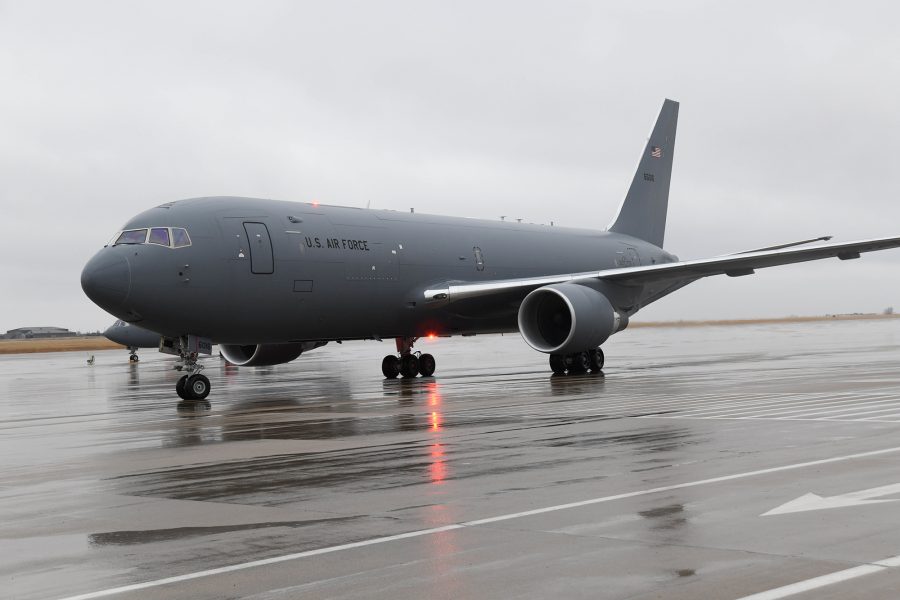Chief of Staff Gen. David Goldfein told Senate legislators March 3 the service will not use the new KC-46 tanker unless absolutely necessary to fight a powerful adversary.
The wide-ranging Senate Armed Services Committee hearing—the first of multiple chances the Air Force has this week to argue for its $169 billion budget request—continually circled back to the Pegasus tanker’s most pressing issue: its faulty remote vision system. RVS is supposed to let Airmen see where the plane’s refueling boom is in relation to an aircraft it is trying to gas up. But at around 10 feet from the receiver aircraft, the RVS doesn’t focus well enough to connect, sometimes causing the operator to hit the nearby plane.
“We are meeting every day on that topic,” Air Force Secretary Barbara Barrett said. “It is really one of the highest priorities in the building.”
She reiterated the Air Force’s intent to find a solution to the RVS problem by the end of March.
Boeing’s new Chief Executive Officer David Calhoun “committed to me that the KC-46 was his top military priority and he was going to do what was required to fix it,” Goldfein said. “I have seen a change in the behavior of that company since he took over. That’s why we’re more confident sitting here today that we have a serious fix on the table.”
KC-46 is slated to be ready for operations in 2023 or 2024. But Goldfein still isn’t comfortable enough with the tanker to let it fly regular missions. Instead, the Air Force will only send it into battle with highly trained crews if absolutely necessary. Without an RVS fix in place, Airmen would not only deal with blurry vision but also issues like a blinding glare off of the receiver airplane on clear, sunny days.
“If we go to a high-end contingency, we will put every KC-46 we have into the fight,” Goldfein said of a conflict with a country like Russia or China. “We won’t use it for day-to-day operations, but it will be made available for a contingency.”
In addition to refueling, Pegasus is built to perform airlift and aeromedical missions. Goldfein said the Air Force is still in the process of certifying the KC-46 for aeromedical flights. The jets will begin aeromedical missions as soon as certification is complete.
KC-46 is a $32 billion, 179-jet program expected to deliver aircraft into the late 2020s, after the Air Force received its first Pegasus more than a year behind schedule. The service is buying about a dozen of the aircraft each year, though its top uniformed officer said the product isn’t worth the cost right now. He added that the service and Boeing also need to determine a schedule for retrofitting already-built tankers with the new RVS.
The Air Force hopes that improvements to the KC-46 will help stop its tanker shortage from worsening as it looks to retire some KC-135s and KC-10s in fiscal 2021 and beyond.
Airmen, who have started testing and training on the tanker, which is a top-five USAF acquisition priority, will also shuffle between the tanker variants as Boeing rolls out its hardware solution. “Our plan is to have [Active-duty Airmen] available for the tankers that are operational and then as soon as we get the KC-46 online and the fixes in place, that manpower comes back” to staff the Pegasus, Goldfein said.
Rhode Island Sen. Jack Reed, the committee’s top Democrat, worried that if a conflict breaks out between the U.S. and another military that requires the KC-46, Airmen who aren’t familiar with the tanker’s issues would endanger themselves or others. Goldfein answered that people will spend some time with the KC-46 during testing and that experienced crews will head into combat.
“When you’re on the receiving end, all you need is a stable boom,” Goldfein said. “Because you’re training on refueling all the time, the boom, is the boom, is the boom. It’s not going to matter that much for the receiver. We’ve just got to make sure that when that fighter, bomber, or what have you comes off and they’re low on gas and they’re in really bad territory, like I’ve been, that that connection happens and they get the fuel pass that they need.”
He repeatedly told senators that the Air Force is stressing the importance of a fast fix and transition to Boeing for the sake of crew and airframe readiness.
“Three or four years doesn’t sound like time is of the essence to me,” Sen. Jeanne Shaheen (D-N.H.) responded. “I hope that this committee will do what we can to address that as well, because that’s unacceptable.”.
Editor’s note: This story was updated on March 4 at 11:51.
